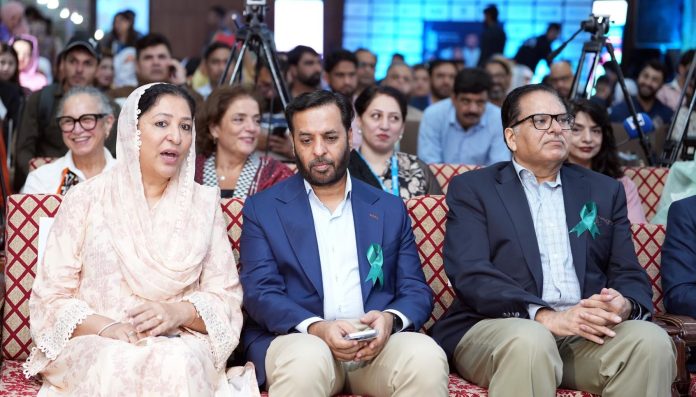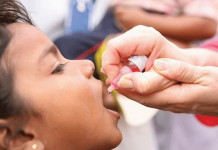By Hina Kiyani
ISLAMABAD: Federal Minister for National Health Services Syed Mustafa Kamal on Monday formally launched Pakistan’s first nationwide cervical cancer vaccination campaign at a Girls’ School in Islamabad.
The program, developed with the support of Gavi and global health partners, aims to protect young girls from a preventable but deadly disease. The first phase of the campaign will run from September 15 to 27 across Punjab, Sindh, Islamabad, and Azad Kashmir.
The inaugural ceremony was held at Islamabad Model School for Girls, F-7/4 where the campaign was symbolically launched by vaccinating schoolgirls. Dr. Rashida Batool Syed, Islamabad’s District Health Officer, administered the vaccine to her own daughter Zainab to mark the official beginning. Other students also received their doses, signaling the government’s strong commitment to safeguarding the health of young girls.
Minister Kamal said the campaign aims to vaccinate nearly 13 million girls aged between 9 and 14 years. He explained that vaccination teams will reach schools, neighborhoods, and even homes to ensure every eligible girl is protected. For households that cannot access centers, parents can call the national helpline 1166 to request vaccination teams.
He strongly rejected misinformation campaigns surrounding the vaccine, calling them dangerous and baseless. “Would we ever give poison to our children? Those spreading lies should fear God,” he said firmly. He stressed that the vaccine is safe and effective, urging mothers in particular to step forward and take responsibility for their daughters’ health.
The minister highlighted that cervical cancer is a global health emergency. Each year, nearly 800,000 women worldwide are diagnosed, and more than 500,000 die. In Pakistan alone, around 5,000 new cases are recorded annually, with over 3,000 women losing their lives.
“The only effective solution is timely vaccination,” he emphasized.
Kamal also linked the campaign to broader health challenges in Pakistan. He revealed that almost 13 million people have fallen below the poverty line due to medical expenses. Costly cancer treatments have forced many families to sell their homes or take on heavy debts. “Hospitals cannot be the answer to every problem; prevention is key,” he said.
The minister warned that Pakistan’s health system is overstretched. “Even if we build hospitals on every street corner, it will not solve the crisis,” he said. According to him, the rising burden of disease highlights the urgency of investing in prevention, sanitation, and awareness instead of relying solely on curative care.
Speaking about other public health threats, Kamal noted that Pakistan remains the only country where polio has not been eradicated. Each year, around 64,000 parents refuse to vaccinate their children against polio, putting the nation’s progress at risk. Similarly, more than 11,000 women die during pregnancy or childbirth annually.
He also underlined the role of unsafe water in spreading disease. “Sixty-eight percent of illnesses in Pakistan stem from contaminated water,” he revealed. Kamal urged improvements in sewerage treatment systems, warning that failure to act would deepen the health crisis.
The minister expressed concern over the risk of dengue spreading due to stagnant floodwaters. He confirmed that the government has already begun fumigation and fogging campaigns in Islamabad and other major cities. However, he stressed that citizens must adopt preventive practices to protect themselves and their communities.
The ceremony was attended by senior health officials, education leaders, and representatives of the World Health Organization. DG Health Dr. Ayesha Ahsani and DG Immunization Dr. Sophia highlighted the urgent need for the campaign. They explained that every minute a woman somewhere in the world is diagnosed with cervical cancer, and every two minutes, one dies.
WHO Pakistan’s Head, Dr. Dapeng Liu, called cervical cancer a “silent killer” and praised Pakistan for joining the global mission to eliminate the disease by 2030. He urged parents to vaccinate their daughters without delay, stressing that immunization is the most effective shield against the disease.
Minister of State for Education Wajiha Akram also addressed the audience, emphasizing the importance of mass awareness. She said teachers, religious leaders, and community influencers will be engaged to spread accurate information. “We must counter myths and ensure our daughters’ futures are secure,” she remarked.
International partners, including Gavi, were thanked for providing both technical and financial support to Pakistan’s immunization efforts. Officials said the campaign was part of a larger initiative to strengthen women’s health services and reduce preventable deaths. The initiative was described as a turning point in Pakistan’s fight against cancer.
In his concluding remarks, Minister Kamal once again appealed to parents and communities to support the vaccination teams. “Spread the government’s message, encourage others, and take part in this national mission,” he said. “Together, we can protect our daughters, prevent unnecessary deaths, and secure a healthier future for Pakistan.”




